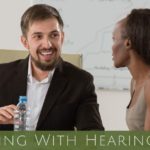Walk a Mile in Their Shoes
Hearing loss is a condition that affects tens of millions of Americans and their loved ones. Communication can often be difficult because of missed words or phrases and repetition, which can then lead to misunderstanding and frustration. Elements like environmental noise or multiple voices can exponentially complicate simple conversation for someone with hearing loss.
Starkey Hearing Technologies recently asked their social media following, “What’s one thing you wish other people understood about hearing loss?” It gave space and voice to people living with hearing loss and using hearing aids to share their experiences, not only with people with normal hearing, but also with each other. The empathy the discussion generates can only lead to better communication.
Accommodation
Some people spoke about ways in which normal hearing people could converse with them differently and therefore more effectively. One participant, Diane R., reminds people that it’s not always about volume, but rather word recognition and articulation. She also would like to teach people to “speak to you directly and not walk away, cover their mouths, whisper, and take your head out of the fridge if you are talking!” The last is usually a good strategy for clear communication.
Essentially, Diane is asking for accommodation and support in communicating with friends and family. Because she puts emphasis on direct speaking directly to someone and not covering the mouth, she could be someone who uses lip-reading in conjunction with a hearing aid. A very common practice with those living with disabling hearing loss.
Overcoming Stigma
Unfortunately, wearing a hearing aid, or even coming to a healthy decision that you may need one, carries negative associations in many parts of society. Ageism fosters embarrassment and can be a barrier between you and healthy hearing.
“Having a hearing loss doesn’t mean that there’s something wrong with you. Hearing aids are stigmatized as a sign of getting older, and there’s often a negative and embarrassment association tied to them. What’s more embarrassing: having a hearing device in your ear or constantly asking people to repeat themselves or missing out on life/conversations?” – Kelsey B.
Hearing loss as a sign of getting older is a misconception because, in fact, disabling hearing loss affects populations of all ages. Though it is rare, some babies are born deaf depending on pre-birth conditions, young adults often risk damaging their hearing due to loud music and extended use of headphones and earbuds, and adults working in loud environments without ear protection are also affected. Kelsey’s story is one that asks us not to marginalize and discriminate, but instead see it from the other person’s perspective.
Volume Doesn’t Always Speak Volumes
“Volume will not always deliver clarity. If you have hearing loss, don’t put off getting hearing aids. Wait too long and your ability to understand and adapt decreases.” – Tracey N.
“Sometimes the louder people speak, the more distorted the message becomes. I wear new Starkey hearing aids and can tell you without a doubt that people do mumble or turn their voice away from you when they speak.” – Donald J.
“If I need you to repeat something and I still can’t understand what you said, change your words. Don’t say ‘I’m going to the gym.’ ten times, louder each time you say it. Instead try, ‘I am going to work out.’ Sometimes it isn’t the volume of your speech, it’s word recognition.” – Lanie B.
These three participants note a clear misconception about hearing loss. One thing many people may not realize is that we do not hear only with our ears, we hear also with our brains. The ear canal collects noise and it travels through the auditory pathway to the brain where those sounds are processed into information. Speech recognition also takes place in this process. So, when hearing loss is present, someone may be having trouble discerning noise from speech, decoding and contextualizing it, and possibly missing words and phrases while doing so.
Communication and Compassion
A bridge to understanding is built with communication. Effective communication happens when all parties are open to accommodation for communication’s sake. What are ways we can better understand one another? Eye contact, body language, clarity, empathy, to name a few. Keeping an open mind can also lead you down a path toward relating with friends and relatives living with hearing loss. As the aphorism goes: Before you judge a man, walk a mile in his shoes.
If you experience a hearing loss and have yet to seek treatment, now’s the time. Treating hearing loss brings significant benefits to your overall life and well-being. Contact a certified hearing health professional in your area today to schedule a hearing test, and be sure to shop our discount hearing aids.






